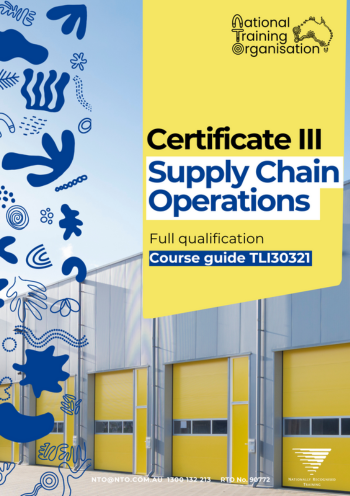Why Should I Do This Course?
Nationally Recognised Qualification
Achieve a Certificate III in Supply Chain Operations, a nationally recognised
credential that opens doors to a variety of roles within warehousing, logistics, and
distribution centres.
Develop Essential Supply Chain Skills
Master the core skills required in supply chain operations, including receiving and
dispatching goods, inventory management, safe work practices, and workplace
communication.
Gain Industry-Specific Knowledge
Understand supply chain principles, logistics processes, inventory control
systems, and workplace health and safety requirements.
Enhanced Employability
Become a sought-after professional in the growing supply chain sector, with
opportunities to work in roles such as warehouse operator, logistics coordinator,
or distribution clerk.
Duration of Course: Up to 12 months to complete the course (may vary depending
on experience and support needs). Allow for 12-15 hours of self-guided learning
per week.
Available State:NSW, QLD
Certification: Statement of Attainment
Course Cost: $6,410
Delivery Mode:The course is delivered using a blended learning model,
combining face-to-face and self-paced learning with online support.
What Will I Get?
Upon successful completion of this course, you will be able to:
- Receive and dispatch goods efficiently and accurately.
-
Apply safe manual handling techniques and operate warehouse equipment
safely.
- Maintain accurate inventory records and control stock levels.
- Contribute to the efficient movement of goods throughout the supply chain.
- Communicate effectively with colleagues, supervisors, and customers.
- Follow workplace procedures and comply with safety regulations.
- Apply problem-solving skills to address challenges in supply chain operations.
Course specification
To achieve this qualification, competency must be demonstrated in a total of 14
units of competency consisting of:
General Qualification:
2 core units
12 general elective units selected from Group C
Specialisation:
2 core units
4 units from one of the specialist elective groups (Group A or Group B)
8 general elective units selected from Group C
Up to 3 of the general elective units may be imported from any relevant
nationally endorsed Training Package. The elective units must contribute to the
vocational outcomes of the qualification.
Where imported units are selected, care must be taken to ensure all prerequisite
units specified are complied with.
Core units
| Core Units | Compulsory |
|---|
| TLID0020 | Shift materials safely using
manual handling methods |
| TLIF0009 | Ensure the safety of transport
activities (Chain o
Responsibility) |
Elective units
| Group A | Logistic Operations |
|---|
| TLIA1001 | Secure cargo |
| TLID0015 | Load and unload goods/cargo |
| TLIE0008 | Calculate mass, area and quantify dimensions |
| TLIH0005 | Interpret road maps and navigate pre-determined routes |
| Group B | Warehousing Operations |
|---|
| TLIA0004 | Complete receival and despatch documentation |
| TLIA0010 | Identify goods and store to specifications |
| TLIA0015 | Organise receival and despatch operations |
| TLIX0013X | Maintain stock control and receivals |
| Group C | General Elective Units |
|---|
| BSBFIN302 | Maintain financial records |
| BSBINS302 | Organise workplace information |
| BSBINS308 | Control records |
| BSBOPS304 | Deliver and monitor a service to customers |
| BSBOPS305 | Process customer complaints |
| BSBPEF301 | Organise personal work priorities |
| BSBPUR301 | Purchase goods and services |
| RIIHAN301E | Operate elevating work platform |
| TLIA0004 | Complete receival and despatch documentation |
| TLIA0005 | Connect and disconnect reefer units |
| TLIA0006 | Coordinate goods to bond premises |
| TLIA0008 | Coordinate stocktakes |
| TLIA0009 | Coordinate terminal/wharf equipment operations |
| TLIA0010 | Identify goods and store to specifications |
| TLIA0013 | Maintain container and freight records |
| TLIA0015 | Organise receival and despatch operations |
| TLIA0016 | Organise warehouse records operations |
| TLIA0017 | Process receipt and delivery of containers and cargo |
| TLIA1001 | Secure cargo |
| TLIA3026 | Monitor storage facilities |
| TLIB0005 | Operate pooled equipment |
| TLIB2001 | Check and assess operational capabilities of equipment |
| TLIB3002 | Test equipment and isolate faults |
| TLID0001 | Load and unload vehicles carrying special loads |
| TLID0003 | Control lift and movement of crane |
| TLID0006 | Move materials mechanically using automated equipment |
| TLID0008 | Shift loads using bridge or gantry crane |
| TLID0009 | Shift loads using cranes |
| TLID0012 | Operate a vehicle-mounted loading crane |
| TLID0015 | Load and unload goods/cargo |
| TLID0016 | Operate a forklift |
| TLID0018 | Prepare for transport of dangerous goods |
| TLID3011 | Conduct specialised forklift operations |
| TLID3015 | Identify and label explosives/dangerous goods |
| TLID3023 | Use specialised liquid bulk gas transfer equipment |
| TLID3024 | Use specialised liquid bulk transfer equipment (gravity/pressurised) |
| TLID3031 | Rig load |
| TLID3035 | Operate a boom type elevating work platform |
| TLID3036 | Lift and move load using a mobile crane |
| TLIE0003 | Consolidate manifest documentation |
| TLIE0004 | Maintain freight records |
| TLIE0005 | Undertake rigger/dogger and operators communications |
| TLIE0008 | Calculate mass, area and quantify dimensions |
| TLIE2007 | Use communications systems |
| TLIE3016 | Estimate/calculate load shifting requirements for a mobile crane |
| TLIF0006 | Administer a fatigue risk management system |
| TLIF0020 | Safely access the rail corridor |
| TLIF0080 | Implement and monitor the safety duties of transport activities (Chain o
Responsibility) |
| TLIF3003 | Implement and monitor work health and safety procedures |
| TLIF3022 | Implement/monitor procedures when warehousing/storing dangerous
goods/hazardous substances |
| TLIF3091 | Apply awareness of dangerous goods and hazardous materials
requirements |
| TLIH0004 | Lead a work team |
| TLIH0005 | Interpret road maps and navigate pre-determined routes |
| TLIJ0003 | Apply quality systems |
| TLIJ3005 | Sample, inspect and test products to specifications |
| TLIJ3006 | Implement grain protection procedures |
| TLIK2010 | Use infotechnology devices in the workplace |
| TLIL0007 | Complete workplace induction procedures |
| TLID3024 | Use specialised liquid bulk transfer equipment (gravity/pressurised) |
| TLIL3002 | Undertake employee payroll activities |
| TLIL3003 | Conduct induction process |
| TLILIC0003 | Licence to operate a forklift truck |
| TLILIC0004 | Licence to operate an order picking forklift truck |
| TLILIC0011 | Licence to operate a reach stacker (greater than 3 tonnes capacity) |
| TLIO0001 | Undertake emergency response action to a security threat |
| TLIO0002 | Apply and monitor workplace security procedures |
| TLIO0003 | Follow security procedures when working with goods and cargo |
| TLIU2012 | Participate in environmentally sustainable work practices |
| TLIU3011 | Implement and monitor environmentally sustainable work practices |
| TLIW3006 | Operate computerised mail and parcels sorting equipment |
| TLIW3008 | Carry out culler facer canceller operations |
| TLIX0004X | Administer inventory systems |
| TLIX0005X | Administer market supply systems |
| TLIX0013X | Maintain stock control and receivals |
| TLIX0015X | Manage fundamental aspects of supply chains |
Is this course right for you?
Entry Requirements:
This course is suitable for individuals seeking a career in the supply chain industry
or those currently working in warehousing, logistics, or distribution roles who wish
to gain a formal qualification.
If you do not hold a Year 10 Certificate or equivalent, you will be required to
undertake an LLN assessment before commencing the course. This assessment
helps us ensure you have the necessary skills to succeed in your studies.
[Start Your Assessment]
Technical Requirements:
Ensure you have access to:
- A computer with basic software (Word, Excel, etc.)
- A camera, microphone, and headset (for online classes)
Support and Advice
We are committed to supporting you throughout your learning journey. Whether you’re a student or an employer, we are here to assist with any questions you have about the course, entry requirements, or group enrolments.
Contact Us for More Information
.
"
Further Study Pathways
For Students:
Advance your skills with a Certificate IV in Logistics or a Diploma of Supply
Chain Management. Further explore related areas such as warehousing,
transportation, or procurement with relevant qualifications.
Specialised Skills:
Gain expertise in specific supply chain areas with short courses in inventory
control, warehouse management, or freight forwarding.
For Employers:
Help your workforce develop further with specialised skill sets and certifications in
areas relevant to your industry, such as inventory management or freight
operations.
Fees and Payment Information
At NTO, we are committed to ensuring the financial protection and transparency of
all students and corporate clients in line with Australian regulations. Below, you
will find detailed information regarding course fees, payment terms, and options
available to you.
- Course Fee: $6,410
- Deposit and Prepaid Fees: No more than $1,500 in prepaid fees prior to
course commencement.
- Payment Plans: Flexible options to pay in full or on a payment plan.
- Buy Now, Pay Later (BNPL): Available for short courses.
- Invoice Payments: Available for corporate clients.
For detailed information on payment plans, BNPL, and invoicing, please reach out
to our team.
[Explore Further Courses]
Learner Rights and Refunds:
- Cooling-off Period: You have the right to a statutory cooling-off period if one applies to your enrolment. NTO will provide you with information about your rights as a consumer prior to enrolment, including your right to a full refund for services not provided under the terms of your agreement.
- Refunds: If the arrangement is terminated early or NTO fails to provide the agreed services, you are entitled to a refund for any fees paid for services not rendered. This includes any unutilised portion of course fees.
- Refund Conditions: Refund requests can be made in writing, and NTO will respond to requests promptly and in accordance with our refund policy.
Credit Transfer and Recognition of Prior Learning (RPL)
NTO recognises skills from other sources besides formal training. If you have prior experience or qualifications, you may be eligible for RPL or Credit Transfer. This process reduces the need for repetition of learning.
RPL Process:
- Request RPL for partial or full qualification.
- Complete the RPL Assessment Kit.
- Trainer interview to assess your experience.
- If required, complete practical assessments.
- Gap training costs will be provided if necessary.
For more information about fees, payment plans, or to discuss RPL, please contact our administration team.
Student
To get started, you'll need to meet the following requirements:
- Completion of a Year 10 School Certificate (or equivalent).
-
A valid USI (Unique Student Identifier). If you don't have one, you can easily create it here:
www.usi.gov.au
- Access to a personal computer and internet for online learning.
Employer
If you're looking to upskill your workforce with tailored training, we offer customised courses designed to meet your specific business needs.
Book a Call
You can start the registration process online through our eSkilled platform, or, if you prefer, book a call with one of our Student Advisors to discuss the course in more detail. For employers, we offer the option to either book a call to customise a course that meets your organisation's specific needs or explore our tailored corporate training solutions through our eSkilled platform.




















